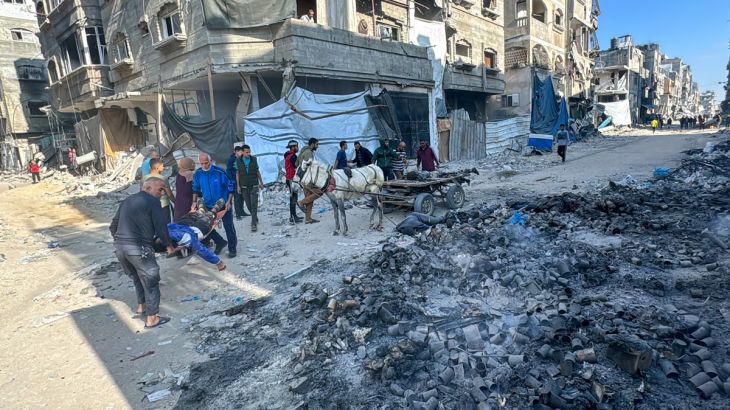Israeli attacks on Gaza kill at least 88, including children in their sleep
Air raids on Beit Lahiya and Gaza City come as humanitarian crisis worsens in besieged territory.
Video Duration 01 minutes 28 seconds 01:28
War on Gaza: More than 60 killed in Israeli attack on residential area in Beit Lahiya
Published On 21 Nov 202421 Nov 2024
Israel has unleashed a series of air attacks on the Gaza Strip that killed nearly 90 people, including many children in their sleep, as its main ally the United States once again vetoed a United Nations Security Council resolution demanding a ceasefire.
At least 66 people were killed in an attack early on Thursday that hit a residential neighbourhood in Beit Lahiya, in Gaza’s besieged north, Palestinian health officials said.
Hussam Abu Safia, the director of the nearby Kamal Adwan Hospital, told Al Jazeera most of the victims “were asleep when they were killed”.
“A very large number of casualties has arrived, and there are still many bodies hanging on the walls, ceilings. It’s mostly children and women,” he said in a voice message.
Abu Safia said hospital staff rushed to the site, retrieving bodies, collecting remains and rescuing trapped people.
“We are already operating with the bare minimum resources, that is why most of our staff are now busy rescuing the injured … due to the lack of ambulances and resources,” the paediatrician added.
“The situation is honestly very dire. We cannot cope with this massive number of injured and casualties that have arrived to Kamal Adwan Hospital.”
Separately on Thursday, at least 22 people, including 10 children, were killed in Israeli bombardment of Gaza City’s Sheikh Radwan neighbourhood, a civil defence spokesman said.
1-14: Ceasefire resolution blocked by US
More than 13 months of Israeli attacks on Gaza have killed some 44,000 people, including more than 17,000 children, and wounded 104,000. With aid largely cut off, many in the densely populated territory are now facing the threat of starvation.
Israel launched its ferocious military campaign after an estimated 1,139 people, mostly civilians, were killed in an attack led by the Palestinian armed group Hamas on October 7 last year, with some 250 people taken captive. About 100 of them were released after a truce and prisoner swap deal a year ago but negotiations have largely stalled since then.
Thursday’s overnight attacks took place hours after a Security Council resolution calling for a ceasefire in Gaza and the release of the captives failed to pass when permanent member, the US, cast a lone No vote in the 15-member body.
This was the fourth time that US President Joe Biden’s administration has vetoed such a resolution since the start of the war.
Deputy envoy Robert Wood said the US, which provides Israel with at least $3.8bn in military aid annually, could not back the measure because it was not linked to the immediate release of those held in Gaza.
“We made clear throughout negotiations we could not support an unconditional ceasefire that failed to release the hostages,” he said.
A man cries over the bodies of his relatives killed in an Israeli air attack on the Al-Mawasi area, at Nasser Hospital in Khan Younis, southern Gaza Strip [Haitham Imad/EPA-EFE]
As the latest international attempt to bring an end to the fighting failed, civilians in Gaza continue to bear the brunt, especially in the northern governorate which has been under an Israeli siege for more than six weeks. Israel maintains that it wants to prevent the regrouping of Hamas in the area.
In addition to the ongoing shelling, residents across Gaza are struggling to cope with a worsening humanitarian crisis as winter approaches.
Most Palestinians, who have been forced to flee wave after wave of Israeli attacks, live in tents and makeshift shelters that are inadequate for cold wind and rain. The Norwegian Refugee Council has warned that more than one million Palestinians in Gaza do not have sufficient shelter for the coming months.
Food provision is another issue.
Certain pockets across the 2.2 million-strong territory are on the cusp of famine and a growing number of civilians are suffering from acute lack of food.
The entry of aid trucks has been severely hampered by Israeli authorities and, lately, by criminal gangs operating in areas under Israeli control, according to reports.
